20 Foods To Avoid During Early Pregnancy
This post may contain affiliate links. As an Amazon Associate, I earn from qualifying purchases.
If you’re a first-time mom who just found out you’re pregnant (congrats mama!), it’s time to figure out what foods to avoid during early pregnancy.
It’s a good idea to question the foods you eat because while some seem harmless they might not be good for your growing fetus during early pregnancy. I remember being so confused about what foods to avoid during early pregnancy or any time during my pregnancy.
What do I really have to avoid? (Aka myth vs truth.) What foods should I eat in moderation? What should I eat when nothing sounds good?
So, let’s take a look at what foods to avoid during early pregnancy…(and the rest of your pregnancy for that matter).
Key Takeaways
Here’s a quick overview of foods to avoid, for more insight keep reading:
- Raw fish
- High mercury fish (even cooked)
- Raw meat
- Deli meat
- Raw eggs
- Caffeine (talk to your doctor)
- Unpasteurized cheese (rare these days)
- Canned food (specifically with BPA liners)
- Raw cookie dough
- Sugary foods (in moderation)
- Greasy foods (high in unhealthy fats)
- Foods left out
- Alcohol (not a food, but still to be avoided)
- Raw sprouts
- Unwashed vegetable (duh)
- Certain fruits if the pregnancy is high risk, including pineapple, green papaya, and eggplant
Disclaimer: Now, I’m not a doctor – I can do the research and tell you about my own experience but if you have any concerns about the foods to avoid during early pregnancy then talk to your doctor and they can provide medical advice.
Want more guidance?
If you want to learn about foods to avoid, I also highly recommend a Pregnancy Nutrition Course from a fellow mama. As a certified nutritionist, she breaks it all down so you know EXACTLY what to eat for a healthy pregnancy.
YOU MAY LIKE: The Ultimate Guide to Pregnancy Nutrition: Best Foods for Pregnancy
20 Foods to Avoid During Pregnancy
1. RAW FISH
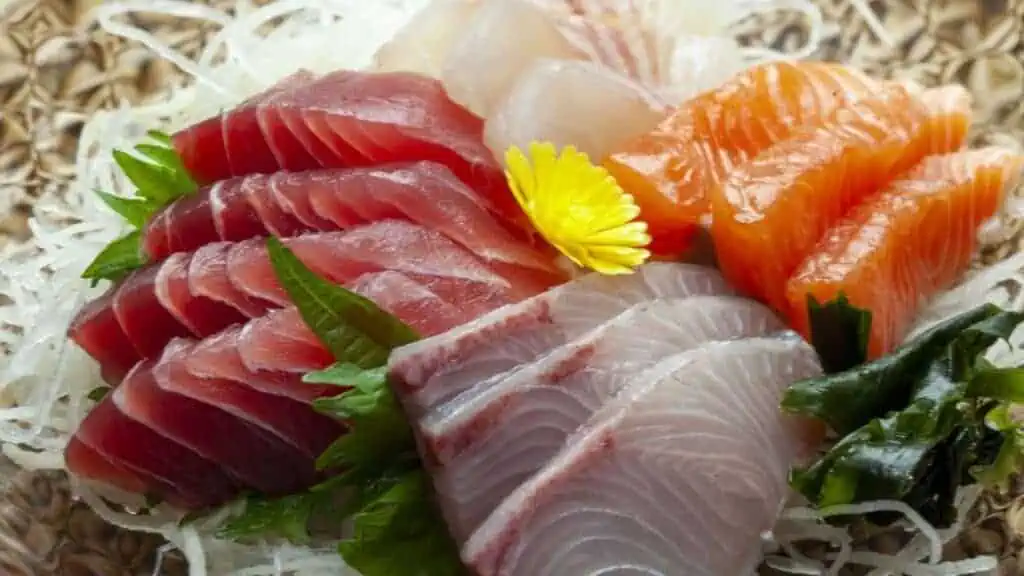
Sadly, you can kiss sushi (and ceviche) goodbye because it’s definitely one of the top foods to avoid during early pregnancy.
Eating raw fish or raw shellfish runs the risk of exposing your growing fetus to contamination that might lead to pregnancy complications.
So, even if you’re an absolute sushi lover, it’s time to put that love aside for the next 9 months. If you’re really craving sushi, opt for vegetarian sushi to load up on your favorite veggies instead (this is literally what I craved the first 6 weeks of my first pregnancy).
2. HIGH MERCURY FISH
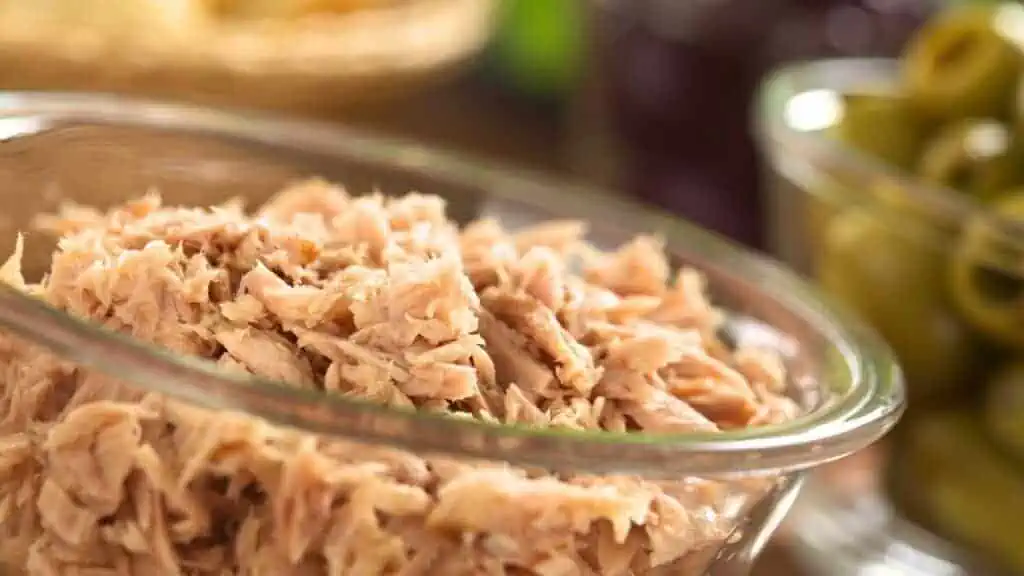
Fish high in mercury isn’t good to eat when you’re not pregnant, so you definitely shouldn’t consume any while you’re pregnant. Mercury is harmful to your baby, period.
Here’s a list of high-mercury fish:
- Shark
- Tuna
- Mackerel
- Swordfish
- Marlin
Those are the kinds of fish to avoid during pregnancy, but that doesn’t mean you should eliminate fish from your diet completely since fish is an excellent source of omega-3 fatty acids, protein, and other nutrients. (source)
Here’s a list of low-mercury fish that are particularly great when ocean caught:
- Shrimp
- Catfish
- Salmon
- Cod
The key to eating fish during pregnancy is to be careful and eat it in moderation.
3. RAW MEAT
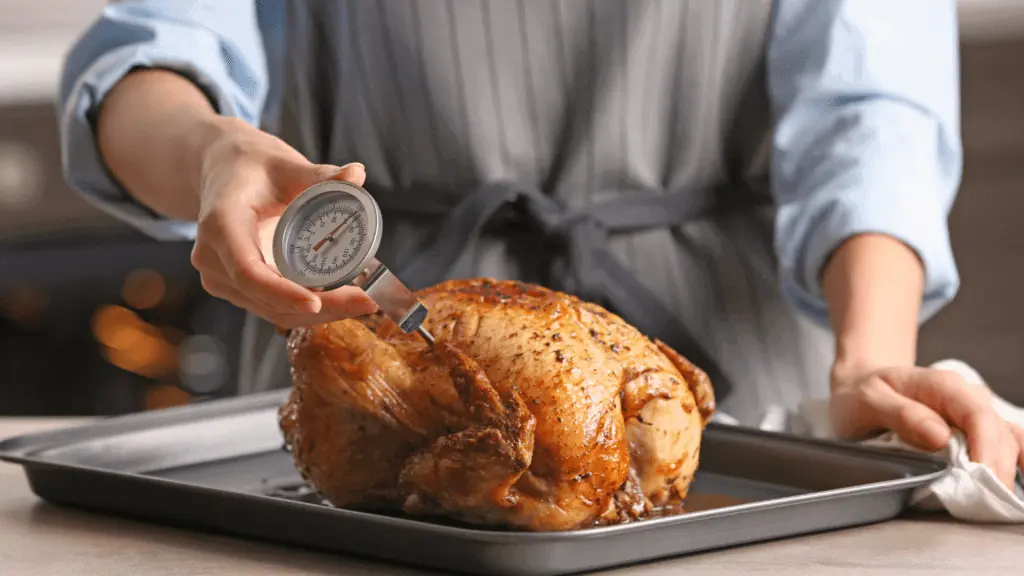
It’s time to ensure that the meat you consume has been handled properly and fully cooked.
Raw meat can contain salmonella, E. coli, listeria, and other harmful bacteria. So, please mama make sure any meat you consume while you’re pregnant is well-cooked!
Beef should be cooked to at least 160 degrees F; chicken to at least 165 degree F (source). So grab your meat thermometer if you have one.
YOU MAY LIKE: Must-Have Pregnancy Resources for New Moms
4. DELI MEATS
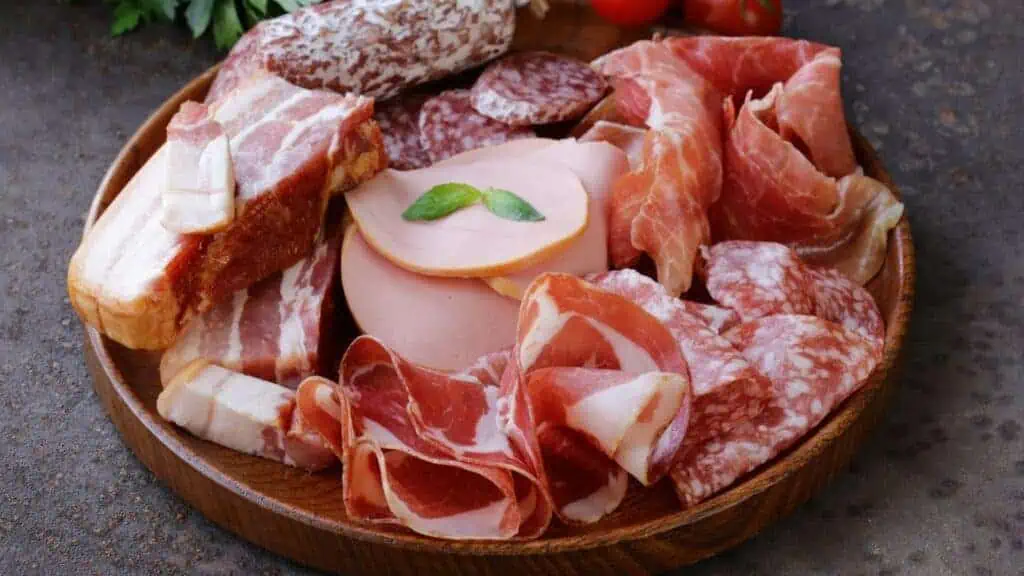
Deli meat and other cured meats aren’t good for you when you aren’t pregnant let alone during pregnancy.
Why?
These kinds of meats are highly processed and can carry all sorts of bad bacteria you wouldn’t want to consume while pregnant. One example is listeria which can be linked to miscarriages, premature birth, stillbirth, and other problems with unborn fetuses. And sadly, there have been a lot of meat recalls lately that make it hard to justify.
Now, that doesn’t mean that all deli meat naturally carries these harmful bacteria; it’s that it has a higher chance of having them. The point is to avoid them when you can, so don’t eat at Subway for the next few months.
If you absolutely want to have these kinds of meats, then proceed with caution and make sure to cook them well first (aka: pan sear that deli meat before you throw it in a sandwich).
5. RAW EGGS

This means a raw egg or any dish with a soft or partially cooked form of an egg. Things like eggs benedict, some homemade salad dressings, and eggnog.
Basically, you should only have eggs if both the white and yolk is fully cooked.
Why?
Because if you don’t eat fully cooked pasteurized eggs, you run the risk of harmful bacteria and no mama wants to do that! You may have noticed a theme at this point- avoid raw foods during pregnancy!
Related read: 100+ of the Best Tips for a Healthy Pregnancy
6. CAFFEINE

Caffeine intake during pregnancy is one of those controversial topics – should you or shouldn’t you?
How much is too much?
The good news is you don’t have to eliminate all caffeine from your diet.
According to the March of Dimes, pregnant women should limit their caffeine consumption to 200 mg per day. (source) So, that’s basically having one cup of coffee a day.
When I was pregnant, I craved a lot of chocolate, which also has caffeine, so I was extra careful about how much I ate.
The point here? Be sensible about how much caffeine you’re consuming.
7. UNPASTEURIZED CHEESE

This usually means soft cheeses (think brie, goat cheese, ricotta), particularly if made from unpasteurized milk (not so common these days), that have a higher risk of containing the listeria bacteria.
By now you’re likely noticing a common theme here – avoid foods with listeria and other bad bacteria during pregnancy.
So why is that?
Pregnant women are experiencing a lot of changes and it can lead to a weakened immune system.
That means when you’re not pregnant you might be able to fight these bacteria off and any issues go unknown to you. Don’t take that risk while you’re pregnant (although it’s ultimately up to you).
8. SOME CANNED FOODS
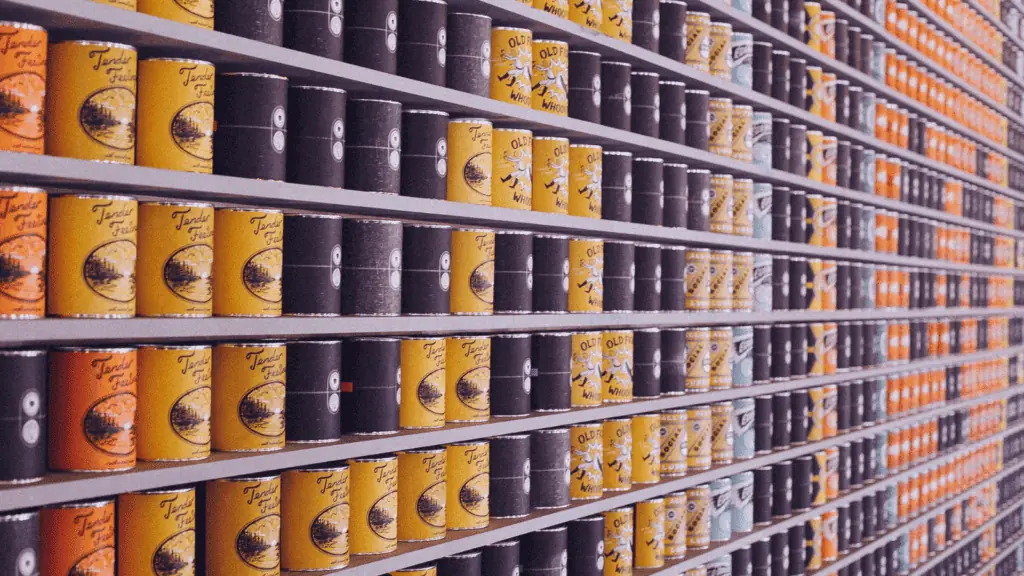
Not only are canned foods highly processed and full of salt, but they can contain BPA – a chemical that can be added to the lining of the can and therefore the food that is in said can. Thankfully, it’s pretty easy to find BPA-free cans these days, but it does require paying attention to labels.
BPA may cause birth defects, which is a good reason for pregnant women (and people in general, honestly) to avoid these kinds of foods. (source)
If your fresh food choices are limited, always opt for cans that explicitly say “BPA free” and drain and rinse the contents to minimize preservatives and salt. Some experts agree that canned beans in a BPA free can are the exception to this rule.
Pregnancy is the perfect time to start cooking from scratch – you can control the ingredients and make sure to eat fresh, healthy foods.
Need help with healthy meal planning? Try Real Plan for customized recipes and a shopping list in one convenient app.
9. RAW COOKIE DOUGH
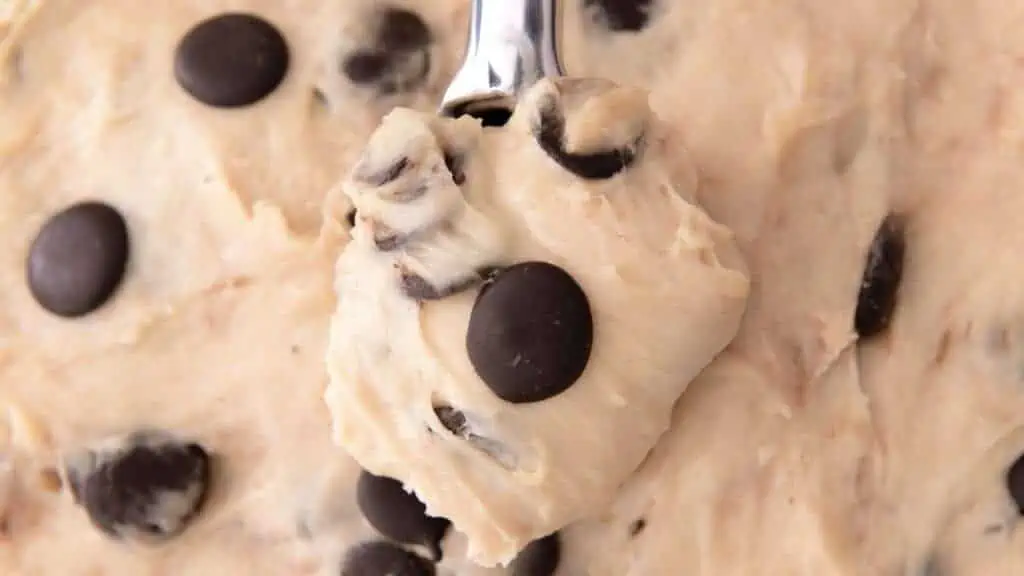
If you love scooping raw cookie dough and eating it (who doesn’t?), you might want to stop until you’re done being pregnant.
Cookie dough contains raw egg, which we know is on the foods to avoid during pregnancy list.
So, while you’re pregnant (and if you have to) grab cookie dough ice cream instead (but please eat it in moderation!) or make your own safe egg-free version.
10. SUGARY FOODS

Whether you’re working on getting pregnant, already pregnant, or not even pregnant at all, a low-sugar diet is always a good idea for your health.
Eating a lot of refined sugars during pregnancy can lead to extra weight gain that you won’t want to deal with postpartum.
I had an insatiable appetite for ice cream during my pregnancy; which means I gained too much weight. While eating ice cream (and cookies) was fun, I was also positioning myself for gestational diabetes, which thankfully didn’t happen.
**Note: Every pregnancy and woman is different. Eating sugar does not mean you will get diabetes. But it can certainly increase your risk, especially if you are overweight or have a family history that predisposes you to it. Talk to your doctor about your concerns!
(Gestational diabetes happens when your pancreas can’t keep up with the demand for insulin and blood sugar levels rise. (source) While eating cookies and ice cream didn’t cause GD for me it caused my OB to be concerned about my blood sugar levels and, ultimately, he advised cutting down on my sugary habit).
Another reason to avoid sugars? The extra weight gain! Part of my postpartum recovery plan was to lose all that baby weight healthily and it took much longer!
11. FOODS HIGH IN UNHEALTHY FAT

While moderation is key, try not to race out to the closest fast-food restaurant while you’re pregnant too often. Most restaurants offer dishes filled with high-fat processed foods to avoid during early pregnancy (and the rest of your pregnancy for that matter!).
But that doesn’t mean you should avoid fats altogether (fats have a bad rep, but not all are created equal). There are plenty of healthy fats such as grass-fed butter, olive oil, avocados, dark chocolate (yum!), and nuts.
These are foods that should be a part of your pregnancy diet.
12. AVOID FOODS LEFT OUT

If you’re at a party and those food trays and dishes are out for more than two hours, then skip eating any of the leftovers.
Food that isn’t properly refrigerated can attract unwanted bacteria and as we’ve seen from other foods to avoid while pregnant, they aren’t good for growing babies in the womb.
This also means skipping the buffet-style restaurants that keep food on hot plates for extended amounts of time.
Bottom line: You want your food hot and freshly cooked!
13. ALCOHOL

This one should be self-explanatory, but after talking to different mom friends, the advice of a glass of wine here or there while pregnant seems to live on.
And, while one glass of wine may not do any harm, why risk it? It’s ultimately up to you and your doctor. (Being married to a European, I was surprised when my Czech OB told me I should have a glass of wine to help induce labor- I wasn’t comfortable personally.)
Pregnancy is 9 months, not a lifetime – so I’d skip drinking alcohol. Want to know the effects of alcohol or weed on your baby, such as fetal alcohol syndrome and the risk of low birth weight? Click here.
14. HIGHLY PROCESSED FOODS
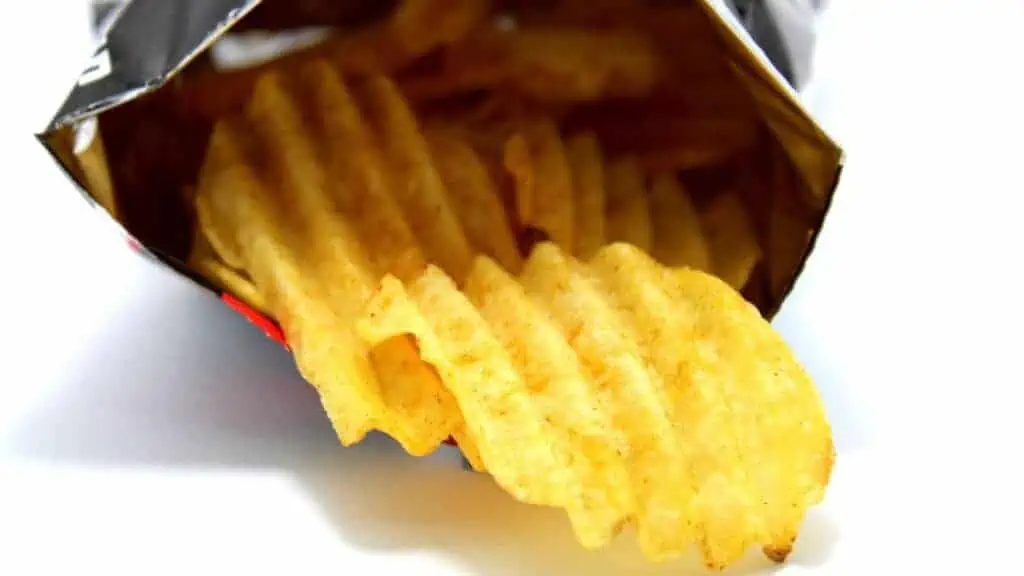
Those highly processed foods like chips, packaged bakery items, and other snacks, might taste really good (and they might be the junk food you crave – I get it!) but they’re full of trans fats, hydrogenated oils, white flour, sugar, fillers, and artificial flavors.
Those aren’t good for you or your baby at any time during your pregnancy.
So skip the junk food aisle and try to find a healthy alternative to satisfy your craving. I found myself living off smoothies (my Vitamix was my best friend) to help with cravings and keep my tummy full (a key to minimizing nausea).
Vegetables to Avoid During Pregnancy

15. RAW SPROUTS
If you aren’t entirely sure what a raw sprout is, here are some examples:
- Bean sprouts
- Mung beans
- Alfalfa
- Clover
- Radish
- Lentils
Because sprouts are grown in a humid climate, they invite bacteria such as salmonella and E. coli and since you’re pregnant your immune system may not be able to fight off food poisoning, therefore, endangering your baby.
That’s why you shouldn’t eat sprouts raw.
If you do have sprouts, buy fresh and make sure to cook them well.
16. CANNED VEGETABLES
As mentioned earlier, canned vegetables should be avoided during pregnancy because of the high sodium content and the risk of BPA being present in the lining of the can (or better, just check your labels!).
The most ideal way to eat your veggies is from the produce section or frozen aisle (where they are flash-frozen at picking).
17. UNWASHED VEGETABLES
Hopefully this is an obvious one, but with baby brain being a very real thing it’s always good to drop a reminder.
Our fresh produce goes through a lot before it makes it to the store for you to buy. Make sure you wash all produce thoroughly to reduce the risk of contamination.
Fruits to Avoid During Pregnancy
See a full list in our article 11 Fruits to Avoid.

18. PAPAYA (Not Ripe)
Unripe green papaya, has something called papain which can stimulate the right hormones that prompt uterine contractions. That might lead to miscarriage.
Papaya is high on the list of fruits to avoid during early pregnancy – don’t eat it at all when you’re in your first trimester and talk to your doctor about consuming it later in pregnancy.
If you’re in your third trimester of pregnancy then perhaps papaya would be a good natural way to prompt labor. (Again not a doctor or midwife, so check with them first!)
Want to read more about avoiding papaya in early pregnancy? Click here.
19. PINEAPPLE
The big concern surrounding pineapple is the fact it contains bromelain which is said to bring on premature labor – something you would want to avoid in early pregnancy.
There is a lot of conflicting information out there so I wanted to include pineapple on my list of foods to avoid during pregnancy so that you are at least aware of potential risk.
I did read one article from a reputable site that said the amount of bromelain consumed in a moderate helping of pineapple is minimal.
My best advice is to speak to your midwife or doctor about any concerns you might have about avoiding this fruit during early pregnancy. After speaking with my doctor and doing my own research I decided I’d be just fine if I eat pineapple. In fact, it’s a great source of vitamins and nutrients you need!
20. EGGPLANT
I know what you’re thinking – you thought eggplant was a vegetable, right?
Eggplant is another controversial food for pregnant women. Why?
Because they contain phytohormones that may signal premature labor. (source) So it is often recommended as one of the foods to avoid during early pregnancy.
Do your research and talk to your health care provider before adding eggplant to your pregnancy diet.
Feel well-informed mama!

There you have it, mama – a list of foods to avoid during early pregnancy. I hope this list makes you feel well-informed and not anxious.
If you’re ever not sure about a food you’re about to eat, just grab your phone and do a quick Google search (thank you technology). If you are concerned about what foods to should avoid during early pregnancy, make sure to speak to your doctor.
Most of the foods to avoid shouldn’t be consumed later in your pregnancy either.
The key is to avoid foods that carry the potential of contamination and therefore an increased risk to your unborn baby.
I’m sure you noticed the common theme – avoid foods that have a high potential for containing harmful bacteria. Your immune system is weakened because, well, you’re growing a tiny human.
Remember pregnancy is for 9 months which isn’t as long as you think, so if some of your favorite foods are on this list, you’ll be able to indulge after your pregnancy.
You might try going to a nutritionist to help you with your pregnancy diet. There are also a ton of great resources about eating well for pregnancy. They’ll be able to offer you a food plan tailored to your pregnancy and healthy alternatives to some of your favorite foods that might need to be avoided now that you’re pregnant.
Remember, if you want a little more guidance see our full guide on Pregnancy Nutrition and check out this awesome course the Perfect Pregnancy Plan.
What foods are you already avoiding now that you’re pregnant? (From morning sickness or for your health?) What foods are you sad about not being able to eat?
RESEARCH SOURCES:
Need help prepping for baby? Start here!
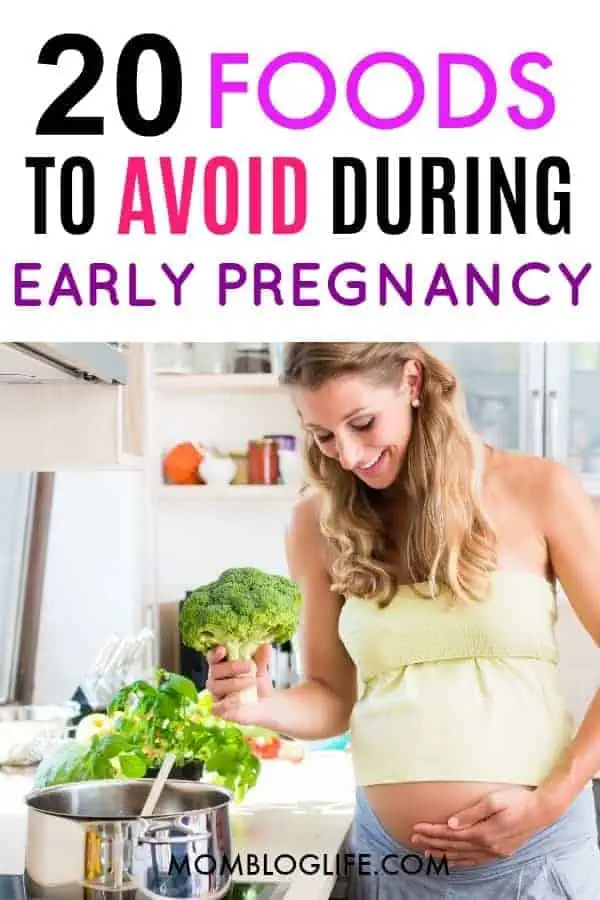
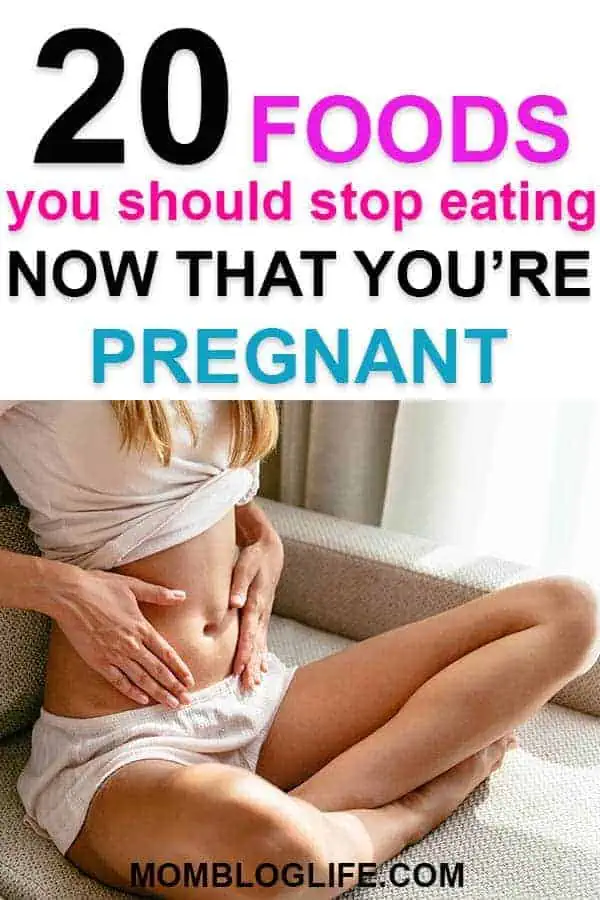

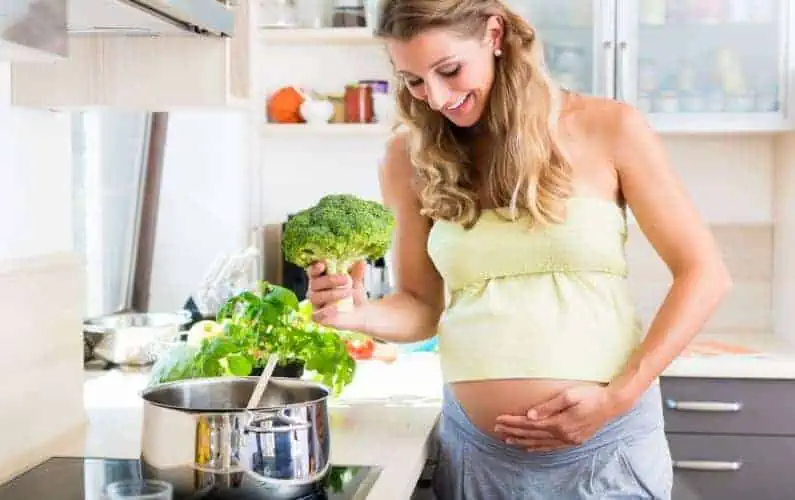





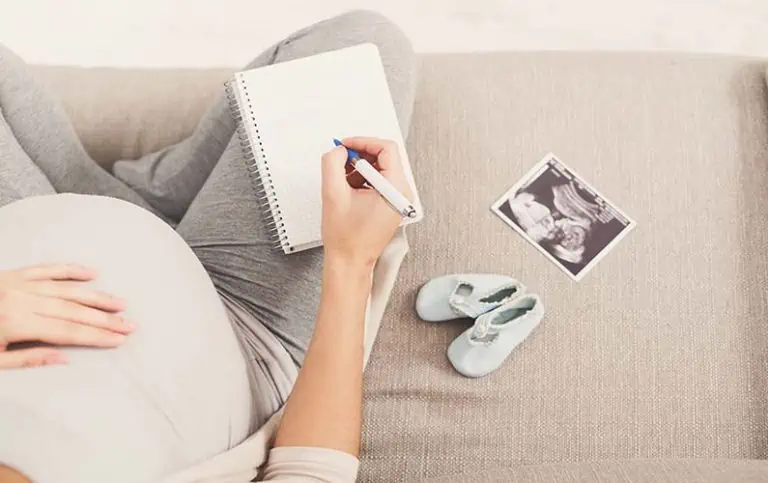

4
You don’t get gestational diabetes from eating sugary foods. I still think sugary foods should be avoided but not to prevent gestational diabetes. That’s just spreading falsehoods and making mothers with GD feel bad for something that is absolutely not their fault because of diet.
Hi Serenna,
Thanks for your comment. I was speaking in my post about my own experience. I was very close to having GD and was advised by my doctor to cut my sugar intake. While eating sugary foods may not ultimately cause GD, if you’re eating a lot of sugars it does make the issue worse. I was also more speaking about my unnecessary weight gain which was definitely caused by high sugary foods!
Thanks for reading!
Elaine x
Thanks for this list! I was pregnant with my daughter ten years ago, and i am beginning the process to become a surrogate so I need a refresher course. There are some things on this list that I was unaware of.
This is a really helpful list for pregnant mamas! I was not even aware of raw sprouts being a potential danger.
It’s amazing how many things there are in our everyday lives that may cause pregnancy problems. I miscarried my first child and wonder to this day if there was something I did that was unhealthy for my baby who failed to thrive in the womb.
Unfortunately, we can’t know it all, but doing the research can help.
Thank you for putting this list together, as I haven’t heard about the risks of some of these foods.
Have you read the book by Lilly Nicholas she has two out right now. Real food for gestational diabetes and real food for pregnant women. She goes into great detail with case studies citing every aspect on food, labs, vitamins ECT. It’s a really great read.
Hi Stephanie,
I haven’t read her book but I checked it out and it looks like an excellent read for anyone who is trying to get a handle on what to eat during pregnancy. Consuming the correct foods is so important! Of course, you can treat yourself but learning about eating real foods during pregnancy would be a good thing. There is way too much processed food on the shelf these days.
Thank you for reading!
Elaine xx
food choice is important your pregnancy health depends on your choice of foods. if you are not choosing right foods it may cause many issues at the time of delivery. which are mention above in this post , i thought deeply on these delivery issues and find as we did so you reap so it is important to chose right for right result.
Thanks for reading!